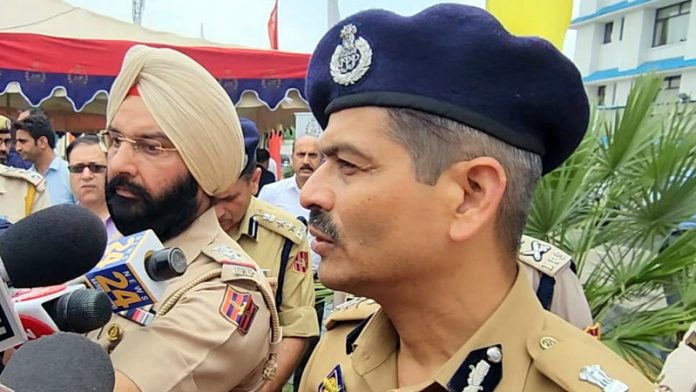Excelsior Correspondent
SRINAGAR, July 1: Director General of Police R R Swain today said that the Bhartiya Nyaya Sanhita provides a clear Legal Mandate to tackle cross-border terrorism in Jammu and Kashmir.
Click here to watch video
Addressing on the occasion of implementation of three criminal laws here at Srinagar, Swain said that Bharatiya Nyaya Sanhita in J&K’s context provides a helpful definition of terrorism as it categorically and explicitly provides a legal mandate to tackle terrorism emanating from beyond International Borders.
Follow the Daily Excelsior channel on WhatsApp
Swain said that Nyaya Sanhita has a dedicated section to combat organized crime, ensuring no room for unlawful activities orchestrated by syndicates that pose a grave threat to the internal security of the country.
“We are deeply aware that the responsibility now lies with us to ensure these reforms achieve their full potential. It casts an onerous responsibility on the J&K Police, which have been fighting terrorism for the last 35 years, depleting our core investigative foundation,” he added.
On importance of stable environment for effective law enforcement, Swain said that ensuring public peace, security, and order through the rule of law presupposes that there shall be a semblance of peace and order so that investigators, witnesses, prosecutors and trial courts are able to do their duty free from fear.
“Besides investing heavily in quality training of our Investigating Officers, we have started to prioritize good investigations and have begun ranking districts on various law enforcement parameters to boost healthy competition.”
“The new laws demand more from our existing resources, requiring the strengthening of our verticals, primarily through embedding Law Officers in our core investigative framework. We have requested the Home Department to strengthen us with 321 Law Officers at various levels”, the DGP said.
Outlining the increased responsibilities and capabilities granted to the police, Swain said that police have been granted increased legal mandate in certain domains, accompanied by greater responsibility, particularly in the utilization of CCTVs, which now features real-time capabilities.
“It is now obligatory to maintain records of the arrested persons with grounds of arrest at both the Police Stations and district levels. These records must be digitally displayed, reinforcing transparency and accountability in law enforcement procedures” he added.
On challenges and necessary investments for effective implementation, the DGP said that the new arrangement requires addressing challenges such as infrastructure investment, data security and preventing technology misuse.
“Senior police officers are convinced that quality training of police personnel, such as in forensics, is inescapable. We would sincerely require to strengthen and add to our pool of personnel integral to our Police Station setup who would be forensic experts for handling digital evidence and devices”, he added.
Swain expressed gratitude for the support received in implementing the new laws. “I am indebted to all of you for the constant support and guidance given to us in fulfilling our requirements for the implementation of these laws. These new laws symbolize a paradigm shift in our approach to justice. They embody the country’s commitment to a system that is efficient and effective, and yet fair and transparent, reflective of the aspirations of a rising and aspiring India.”


